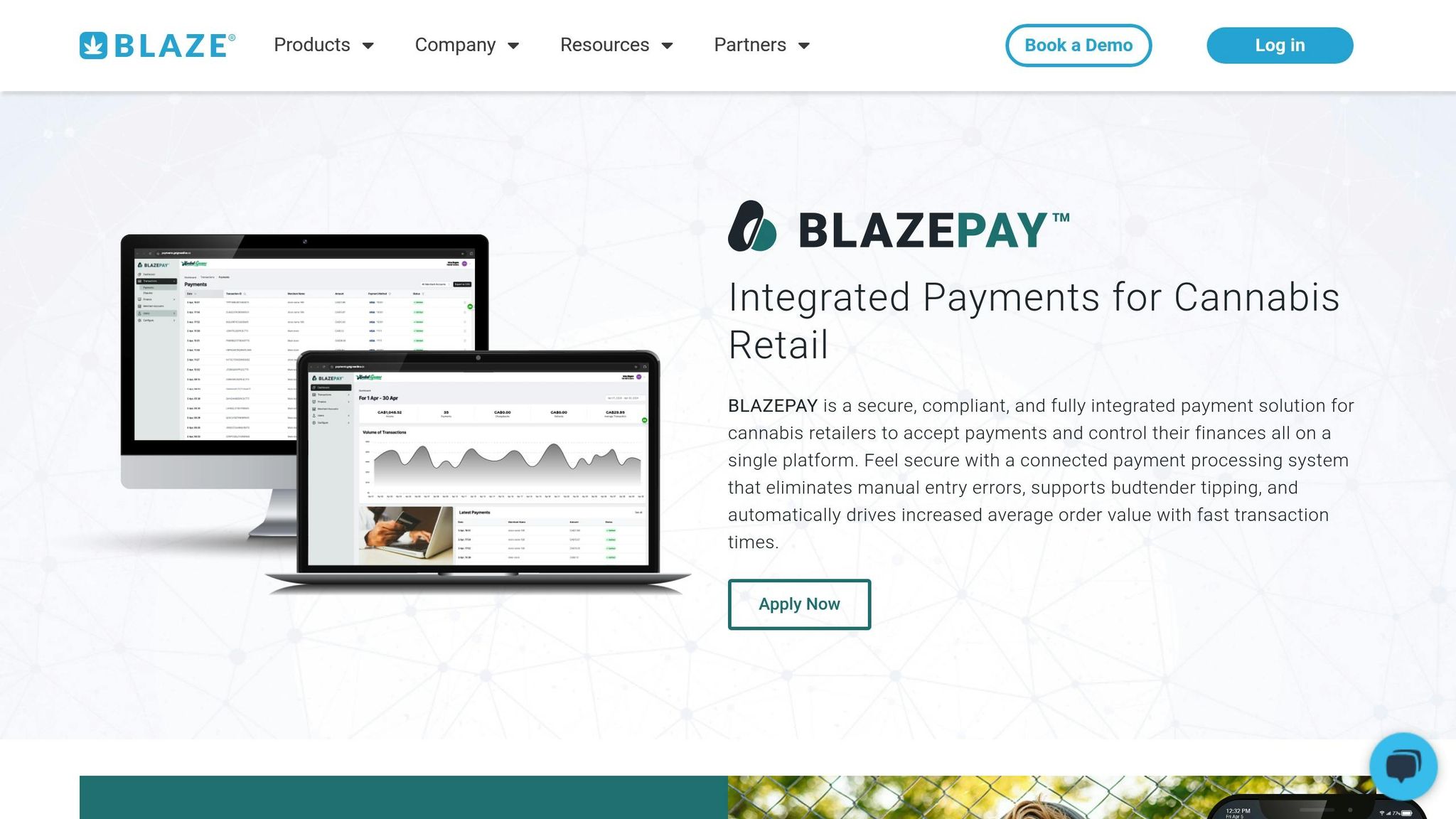Payment outages are a big problem for cannabis retailers, disrupting sales and frustrating customers. With U.S. cannabis sales projected to reach $64.06 billion by 2024, reliable payment systems are crucial. But federal banking restrictions limit access to traditional payment methods like credit cards, forcing retailers to rely on cash-heavy operations or alternative payment solutions. This increases risks like theft and operational inefficiencies.
Key Challenges:
- Federal Banking Restrictions: Limited access to banks and credit card networks.
- Cash Dependency: Higher theft risks and complex cash management.
- Technical Failures: Outdated systems and integration issues.
- Human Errors: Mistakes in transactions and processes.
Solutions:
- Backup Payment Systems: Use multiple processors and offline modes for redundancy.
- Digital Payment Options: ACH transfers, point-of-banking, and blockchain solutions.
- Staff Training: Focus on compliance, transaction security, and emergency procedures.
- Risk Monitoring: Real-time dashboards, automated reports, and compliance alerts.
Reliable payment systems and modern technology, like contactless payments or blockchain, can help cannabis businesses avoid disruptions, improve safety, and increase customer satisfaction.
BLAZEPAY™ Canada Webinar: Maximizing Payment ...

Common Causes of Payment Processing Failures
Payment failures can be a major headache for cannabis retailers, especially given the unique challenges they face. These failures usually stem from three key areas: regulatory barriers, technical glitches, and human mistakes.
Cannabis Industry Regulations and Banking Challenges
The federal status of cannabis in the U.S. creates serious obstacles for payment processing. Major credit card providers like VISA and Mastercard outright ban cannabis transactions. This forces retailers to depend on alternative methods like ACH transfers or cashless ATMs, even though digital payments are far more convenient. To put things into perspective, credit card purchases in 2021 totaled $591 billion, compared to just $58 billion in cash transactions.
Cannabis businesses also face additional hurdles from banking laws, which make payment processing even more complex:
| Banking Challenge | Impact on Payment Processing |
|---|---|
| Federal Illegality | Restricts access to credit card networks |
| Anti-money Laundering Laws | Adds compliance burdens |
| Bank Secrecy Act | Requires detailed transaction monitoring |
| Limited Bank Partners | Reduces available payment options |
These regulatory challenges are only part of the problem. Technical failures and operational issues further complicate the situation.
System and Software Problems
Technical issues are a frequent cause of payment disruptions. For example, in 2021, a system outage at Fiserv affected major retailers across the country. For cannabis businesses, the risks are even higher due to:
- Outdated or incompatible hardware and software
- Payment terminals that aren't up to date
- Lack of proper system integration
These problems make it harder to process payments smoothly, leaving businesses vulnerable to disruptions.
Human Errors and Process Weaknesses
Mistakes by staff and inefficiencies in processes can also lead to payment failures. Research shows that companies receive about 25% of invoices twice, pointing to widespread process gaps. Gina Armada, CEO of MHC, highlights the importance of modernizing operations:
"Simply put, automation is the key to an agile and scalable AP automation operation. As technology advances, finance leadership will further understand the importance of investing in a solution that allows their AP team to go from transactional to strategic."
Staff-related issues often include:
| Error Type | Impact | Prevention Method |
|---|---|---|
| Transaction Misprocessing | Incorrect payment amounts | Implement double-check protocols |
| Authorization Bypassing | Security risks | Enforce standardized procedures |
| Delayed Processing | Failed transactions | Follow prompt completion guidelines |
| Data Entry Mistakes | Payment rejection | Use automated data capture |
With strict regulations, technical challenges, and human errors all in play, cannabis retailers face a tough environment for payment processing. Identifying these issues is the first step toward building more reliable systems and ensuring smoother operations.
Building Backup Payment Systems
To address the technical, regulatory, and process challenges discussed earlier, having dependable backup payment systems in place is key.
Setting Up Multiple Payment Options
Offering a variety of payment methods helps ensure business operations run smoothly, even during disruptions. Studies indicate that dispensaries providing alternatives to cash see customers spending 30% more on average compared to cash-only setups. Combining digital payments, bank transfers, and manual processing options can keep your business running under any circumstances.
It's also important to carefully evaluate payment partners to maintain consistent service.
Selecting Reliable Payment Partners
Choosing the right payment processor can make or break your ability to handle outages. Here are some critical factors to consider:
| Evaluation Criteria | Why It Matters | Red Flags to Watch For |
|---|---|---|
| System Redundancy | Avoids single points of failure | Dependence on one processing pathway |
| Support Response Time | Reduces downtime during issues | Limited or slow technical support |
| Emergency Protocols | Keeps operations running | No clear backup procedures in place |
| System Integration | Ensures smooth workflows | Poor compatibility with existing tools |
Look for partners that use distinct front-end systems to eliminate single points of failure.
By combining dependable partners with diverse systems, you can build a stronger payment infrastructure.
Creating Automatic System Backups
Backup systems should kick in automatically if the primary payment process fails. This ensures customers can continue making purchases without interruptions. Key elements of an effective backup system include:
- Offline Mode Implementation: Equip your POS systems with offline functionality to securely store and sync transaction data during outages.
- Cascading Payment Processing: Use multiple processors and gateways so that if one fails, another seamlessly takes over.
- Data Security Protocols: Apply real-time encryption, audit trails, role-based access controls, and automated compliance checks to protect sensitive information.
These strategies not only reduce the risk of outages but also strengthen your payment operations in a challenging regulatory environment.
sbb-itb-72191b9
New Payment Technologies for Cannabis Retail
Modern payment systems are changing the way cannabis retailers manage transactions while reducing the risk of processing disruptions. These advancements provide secure, compliant alternatives to cash-only operations, offering new ways to ensure smooth transactions alongside existing backup plans.
Digital and Contactless Payment Methods
Digital payment options are making a big impact on the cannabis industry. Data shows that dispensaries offering non-cash payment methods see average transaction amounts of $112, compared to just $22 for cash-only purchases. Payment systems like point-of-banking and ACH transfers connect directly to POS systems, simplifying processes and reducing errors. Dispensaries utilizing these systems report earning an average of $4,627 more than those relying solely on cash.
"I cannot express how impactful Cova Pay has become for our dispensary; the average transaction size is 3x higher as customers no longer worry about the cash they carry." - Ry Russell, Owner, Maine, USA
| Payment Method | Benefits | Impact on Operations |
|---|---|---|
| Point of Banking | Real-time verification, compliant processing | 31% increase in average cart size |
| ACH Transfers | Direct bank transfers, less cash handling | Automated reconciliation |
| Digital Wallets | Contactless payments, better customer experience | Faster checkout times |
In addition to these digital options, blockchain technology is emerging as a powerful tool for cannabis payment solutions.
Blockchain Payment Solutions
Blockchain technology is addressing challenges in cannabis payment processing with improved security and instant transaction verification. The blockchain market is expected to grow to $130 billion by 2030, highlighting its potential in this field.
Specialized fintech solutions are now available, designed to operate within federal guidelines. These systems ensure secure money transfers and automate compliance documentation. Many platforms also offer features like prepaid debit cards and custom apps specifically tailored to licensed dispensaries.
However, implementing blockchain or other advanced payment systems requires careful attention to compliance. Partnering with attorneys familiar with both blockchain and cannabis regulations is crucial for success. These technologies not only strengthen transaction systems but also work alongside reliable backup strategies to ensure operational stability.
Risk Management and Compliance Steps
Proactively managing risks and adhering to strict compliance measures are crucial for ensuring smooth payment processing, especially in regulated industries like cannabis.
Building Compliance Guidelines
To stay compliant, maintain up-to-date licenses and thorough documentation. Using a cannabis point-of-sale (POS) system that integrates with state traceability systems helps ensure everything runs smoothly.
Each state has its own set of rules. For instance, in California, medical patients can buy up to 8 ounces of cannabis daily, while recreational users are limited to 1 ounce. Automating purchase limits in your POS system can help prevent accidental violations.
"Adhering to compliance not only secures you the legal right to operate a cannabis business but also helps avoid fines and penalties." - Faai Steuer, VP of marketing at Cova Software
These compliance practices also set the stage for effective staff training and consistent monitoring.
Payment Security Training
Training your employees is key - especially since 90% of theft stems from staff errors. Businesses with high turnover rates (over 50%) are even more vulnerable to theft. A solid training program should cover:
| Training Component | Key Focus Areas | Implementation Method |
|---|---|---|
| Transaction Security | POS system use, cash handling | Hands-on training |
| Compliance Procedures | Purchase limits, ID verification | Regular updates and testing |
| Emergency Response | Handling outages, system failures | Scenario-based practice |
| Documentation | Transaction records, reconciliation | Digital tracking systems |
Include detailed opening and closing procedures in your security protocols, complete with easy-to-follow checklists for staff. Regularly updating these processes ensures your team stays informed about changing regulations.
Payment Monitoring Systems
To complement your guidelines and training, real-time monitoring systems add an extra layer of security. These systems provide instant insights into payment activity and help identify issues quickly. Integrating monitoring tools with your POS system ensures all records remain intact, even during disruptions.
Here’s what dispensaries should implement for effective monitoring:
- Real-time dashboards to track current payment activity
- Automated reports summarizing daily and weekly payment trends
- Compliance alerts for purchase limit violations
- Employee activity logs to monitor transaction patterns
Regular audits can also help pinpoint vulnerabilities before they escalate into bigger problems.
Emergency Response Plans
Having a solid risk management strategy is just the start - acting quickly during emergencies is just as important.
Payment Outage Response Steps
When payment systems go down, staying calm and organized is critical. Here's a step-by-step guide:
| Phase | Actions | Key Personnel |
|---|---|---|
| Initial Assessment | Determine if the issue is local or widespread | Store manager, IT support |
| Immediate Response | Implement backup payment methods | Shift supervisor |
| Customer Management | Post updates in-store and on social media | Front desk staff |
| Documentation | Keep track of sales and inventory manually | Designated cashiers |
Manual Transaction Procedures
In case of an outage, assign reliable team members to handle manual transactions. This includes recording sales, verifying customer IDs, and ensuring cash is properly accounted for.
Customer Communication During Outages
Clear communication is key to maintaining customer trust during disruptions. Use these methods to keep everyone informed:
| Communication Channel | Message Content |
|---|---|
| In-Store Signage | Highlight available payment options and explain the situation |
| Social Media | Post updates and share alternative payment methods |
| Email Updates | Explain the issue and provide a timeline for resolution |
| Staff Announcements | Keep employees informed so they can assist customers effectively |
"Communication during an outage should: Inform the customer: Let them know what is happening and what that means for them; Build their confidence: Let them know the situation is being taken seriously and actively worked on so they can safely do other work in the meantime." – Helpscout.com
Conclusion: Maintaining Reliable Payment Systems
Reliable payment systems are a cornerstone of any cannabis retail operation. To avoid payment outages, businesses should focus on having backup systems in place and staying ahead of potential risks. With the cannabis market expected to reach $64.06 billion by 2024, it's crucial that payment systems not only handle growth but also meet compliance requirements.
Digital transactions are transforming retail, making cannabis operations more efficient and secure. To summarize, having strong backup plans and modern payment options is key to staying resilient.
A solid risk management strategy is another critical piece of the puzzle. Here are some essential components:
| Component | Implementation Strategy | Business Impact |
|---|---|---|
| System Redundancy | Work with multiple payment processors | Keeps operations running during outages |
| Power Backup | Invest in commercial-grade generators | Ensures service continuity during blackouts |
| Staff Training | Regularly update staff on payment security | Minimizes human error |
| Compliance Monitoring | Use automated tracking tools | Maintains regulatory compliance |
Combining advanced technologies with a disciplined approach to risk management strengthens operational stability. Gerald Lombardo, Head of Growth at Popl, highlights this advantage:
"Digital and cashless payment methods would have significantly helped cannabis businesses monitor cash flow and accounting transactions, improve business safety, make tax payments easier, and improve customer transactions"


